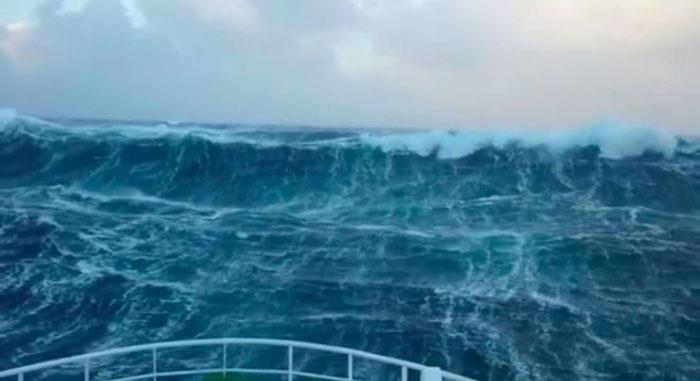
Global wave power is increasing
by Daria Blackwell 4 Jan 15:37 UTC

Monstrous seas mid-ocean © Ocean Cruising Club
Increasing storminess, warmer seas, and rising sea levels are contributing to an increase in significant wave height and wave energy in many parts of the world.
Wind-generated surface waves are increasingly seen as an essential variable in climate prediction, both as an important moderator of the air-to-sea exchange and for its influence on marine and coastal safety, via coastal erosion, flooding, damage to coastal settlements and infrastructure, interference with offshore structures, and shipping design and routes. Naturally, surface waves also have a significant impact on bluewater sailing and boat design.
As oceans warm, they intensify the circulation of winds over the ocean, and stronger winds drive higher waves. Interestingly, the significant wave height is not changing uniformly around the world. For example, a growing body of research suggests storm activity in the Northern Pacific Ocean, the main source of California's winter swells, has increased wave height significantly. In the Northeast Atlantic, on the other hand, significant wave height is projected to decrease. The biggest changes, however, will occur in the Southern Ocean.
As the climate changes, global wind patterns change - so the oceans' waves will change as well. One change already being seen is that many low-pressure systems, which create high winds, are becoming more intense and moving away from the equator and toward the poles. In the Southern Hemisphere, this means more high winds over the Southern Ocean, driving bigger waves. This swell in the Southern Ocean propagates out into the Pacific, Atlantic, and Indian Oceans - which means bigger waves across the Southern Hemisphere and often from directions not previously encountered. Indeed, average wave heights in the Southern Ocean have increased by around 30cm over the past 30 years. That may not sound like a lot, but it can have a profound effect on the outliers. In the Northern Hemisphere, there is more land closer to the pole so the high winds are now occurring more often over land, and ocean waves are actually losing some height.
To examine long-term trends, researchers at Australia's University of Melbourne combined nearly 4 billion measurements of wind speeds and wave heights collected from 31 satellite missions between 1985 and 2018 and data from 80 ocean buoys deployed around the globe into a single, extensive dataset. The researchers found that there have been small increases in mean wind speed and wave height over the past 33 years, but they found stronger increases in extreme conditions, which they define as wind speed and wave height measurements that fall in the 90th percentile or above. So, although the analysis finds that ocean winds and wave heights are becoming more extreme worldwide, the largest increases are happening in the Southern Ocean.
These changes may not affect those already out there sailing the world's oceans today, but they have important implications for understanding where to build infrastructure that survives those changes. Marinas and jetties are already being affected in many places. A series of storms this week has brought 20- to 40-foot swells crashing down onto California's iconic shores, injuring people, flooding streets, and overturning small craft. Understanding the dynamics better will also enable safer routing of vessels crossing those oceans.
Quick Links:
This article has been provided by the courtesy of the Ocean Cruising Club.